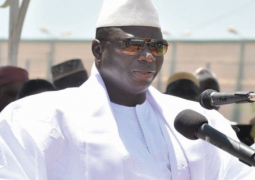He has taken the strain to visit almost every part of our country to meet with the people and see things for himself.
This would really give him a true picture of what is happening across the country, and place him on a better position to steer the affairs of this country.
He has been able to speak to our people, to encourage them to be united, to be hardworking, patriotic and to show solidarity with one another, for we are all one and kindred.
He has continued to denounce tribalism in whatever form it takes – socially and politically – to ensure we work together and continually build a prosperous nation.
He has also made promises of giving light where there is none, and improving health facilities where it is inadequate.
He has inspected large and small farms, and emphasised the importance of widespread cultivation of essential crops like rice.
In general, he has been able to see the state of our infrastructure, our agriculture and the economic condition, especially of our rural people.
The United Nations Conference on Trade and Development of Least Developed Countries Report 2015, launched in The Gambia on Wednesday (25 November 2015), says The Gambia is among 48 least developed countries (LDCs) in the world, which means we are part of the least developed group on the ladder of development.
The report, which highlighted salient factors responsible for the condition LDCs find themselves in, also pointed out that attention should be paid to our rural areas, as these are the societies where a shortfall in human development is much greater.
“The average income shortfall relative to the poverty line is around 20 per cent greater,” the UN report said.
“As the majority of the LDCs population live and work in rural areas, rural development remains the main driver for poverty reduction and the achievement of the SDG (Sustainable Development Goals), which does not mean that urban development should be ignored.”
Economic development is vital in the rural areas, and if this is to be ensured, infrastructural and technological development must be directed also at the rural areas.
The achievement of a city state is realised through the development of each and every part of the nation.
Once our rural setting is undeveloped, we cannot really say we are developing. And we cannot also boast of changing the lives of our people when the largest segment of our society is undeveloped.
We, therefore, welcome our President with an open heart back to the Kombos, and are expecting a renewed vigour in transforming the condition of our country and people.
“Part of my mandate is to curb corruption and streamline a cumbersome, graft-ridden bureaucracy, to put resources where they will provide the clearest results, and to untangle a complicated regulatory environment..”
Benigno Aquino III


